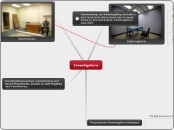Interviewing and interrogating can take a very long time! Many hours can be spent trying to get information interrogations especially
Investigations
Investigating involves a questioning and answering process, known as interrogating and interviewing
Investigating is a primary way of finding information while requiring the cooperation of the police officers, detectives, and any witnesses or suspects in the questioning process
This is designed so that the detectives can find informating that can lead to suspects, arrests, and information about crimes committed
Interviewing
Information gathered here will help investigations greatly, and can lead to new suspects to be interviewed or interrogated
Make sure the interviewees are comfortable, and in a relaxed setting. Facing the door with it open, and sitting anywhere they feel comfortable
The interview process is to get informating from witnesses and from possible victims, so keep in mind during this process to use non-accusatory questions
The powerful interrogation technique
John E. Reid designed these steps, creating one of the more effective interrogation processes out there. These steps won't always assure you a confession, but they help, while staying within the legal and moral boundaries of the law.
The Reid Nine Steps of Interrogation
Step 9
The Written Confession
Step 8
Bringing the Suspect into the Conversation
Step 7
Presenting the Alternative Question
Step 6
Handling the Suspect's Passive Mood
Step 5
Keeping the suspects attention
Step 4
Overcoming Objections
Step 3
Handling Denials
Step 2
Theme Development
Step 1
The Direct, Positive Confrontration
Interrogations
The setting here should be more strict, give the suspect less of a comfortable feeling. They should be faced away from the door and a empty room across from the interrogator
Suspects being interrogated are not always willing to give answers, so being firm and "rough around the edges" when questioning can be a must, while at the same time using caution is neccessary
The Reid 9 steps is used in interrogations, and can be very effective
Must be careful when interrogating, as it is very possible to get false confessions!
Questioning here is meant to get needed information from suspects, and being accusatory can be needed

